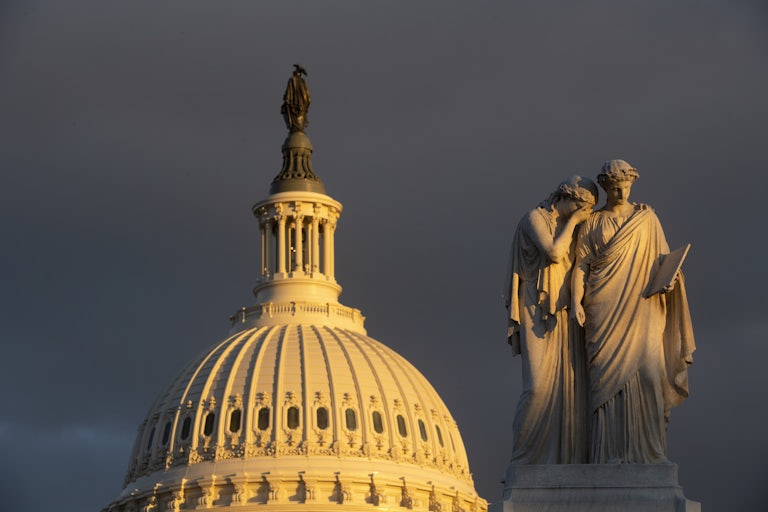Will the Debt Ceiling Deal Mortgage the Democrats’ Future in Washington?
Lawmakers might once again forestall a debt default, but not without teaching the GOP that they can get away with holding the economy hostage.

While it’s been more popular to refer to our current situation as “the latest” or “the most recent” debt limit calamity, the truth is that there’s only ever really been one debt ceiling crisis, and it’s now lasted well over 12 years. It began when President Barack Obama, in one of his less lucid moments as a politician and public intellectual, broke from the tradition of treating the process as the fake, ritualistic bit of nonsense that it was and decided it was a good idea to pair the ceremonial raising of the ceiling with budget negotiations. He did this despite knowing that the GOP wanted an excuse to try to destroy his presidency. A dumb new problem was unnecessarily invented that day, and it handed Republicans yet another weapon in their asymmetrical war with the Democrats.
Much of what’s transpired in the intervening years has been reruns of the same show: The GOP takes the debt ceiling hostage, the Democrats come to rue all those past occasions when they might have disarmed the ticking time bomb when they had the power, and I publish numerous essays full of solid gold advice on how to stop this from happening again—advice that will get ignored by the many dimwits who hold power, to their lasting regret. In terms of what’s changed, there are now more Republicans who think a default would be either no big deal or even preferable to the status quo. We also have a president who, despite having a few good unilateral options at his disposal to end the crisis, refuses to do so because he believes that he was elected to be the Guardian of Phantasmal Norms instead of president of the United States.
And so we slouch, inexorably, toward some future “X-day” when Janet Yellen announces that the magic unraveling of all things has begun. Between then and now, some sort of “debt ceiling deal” might be reached. The Beltway media, possessed of the brains of the average lutefisk, continue to speak about ongoing negotiations despite the fact that the GOP’s one avowed concession is that they’ll raise the debt ceiling—as if the targeted outcome of a negotiation can be considered a concession. But at the moment, I’m more interested in what the future holds. Specifically, what will be the new rules of Washington once all of this is over?
Right now, the deal that is coming into view is a strange one. Where spending is concerned, the talk is of Democrats agreeing to pare back some of $80 billion recently allocated to the IRS along with acceding to GOP demands to reduce discretionary spending across the board. But, according to CNBC’s Christina Wilkie, in a weird face-saving twist, Democrats will be allowed to divert the money originally headed to the IRS “to cover much of the shortfall in domestic funding created by the GOP spending cuts, essentially preserving the programs while technically cutting the overall topline figure.” The end result would thus be farce, instead of tragedy—and we may wonder why we went through all this strife in the first place. As The American Prospect’s David Dayen pointed out on Twitter, “If this is the emerging deal the CBO score is going to be hilarious. Might not even reduce the deficit! What did we do all this for?”
But the kicker is that there’s no real guarantee that the extremists in the GOP caucus will support a deal that’s not actually a deal. And so there’s already talk about how Democrats will apparently need to provide as many as 100 votes to participate in the great negation of their own accomplishments. That’s right: House Speaker Kevin McCarthy can’t even count on the support of his own caucus to get this dumb deal over the line. But he will have no need to feel that humiliated if Democrats volunteer to hold the bag on his behalf.
It’s pretty incredible how quickly we’ve slid from “Biden vows not to repeat Obama’s mistakes” to “Sorry, but we need 100 Democrats to send this bladder of rancid cream to the Senate.” It’s one thing to meekly cave; another thing entirely to offer your own gravedigger to take a turn with the spade.
But the most salient feature of the deal is that it will merely shove the next debt default “X-date” past the next presidential election, which means our 12-year-long debt ceiling crisis will continue. Only now, Democrats—who hope to re-elect Biden—will have confirmed that it’s OK for the GOP to govern in this fashion should they maintain leverage over the debt ceiling. So, where is the limit? What can’t the GOP ask for, in exchange for avoiding default? And will Democrats, when they find themselves with the power to take the debt ceiling hostage, hold it hostage to advance key Democratic priorities over the objection of a Republican president? If this is to be the only possible way of governing going forward, I’d want to know now if Democrats have the stomach for it.
Because I don’t think they do. Biden is said to be balking at the idea of invoking the Fourteenth Amendment to unilaterally disarm the debt ceiling; there is no small amount of concern that should he try this maneuver, it would be the conservative majority on the Supreme Court who might get the final say. The long and checkered history of the Supreme Court primarily runs in the direction of promoting corporate hegemony above all other concerns, so I’m not fully convinced there are five Supreme Court votes to destroy the economy, and I’m not alone in this regard.
But this is all beside the point. If Democrats are willing to concede that the high court might go so far as to destroy the global economy to thwart Joe Biden, then they need to ask themselves: How shall we govern if all roads lead to the depredations of the Roberts court? Biden will be the one to determine whether Democrats spend the next two decades cowering in fear of what the Supreme Court might do. And as The American Prospect’s Ryan Cooper explains, that’s no way to run a country: “A sensible president would not be preemptively conceding the Court’s authority in this area. They would be attacking its legitimacy, and preparing—as Franklin Roosevelt did in a similarly dire circumstance—to disobey it.”
This matter needs to be quickly resolved. Because while you might be able to get enough people to vote in the next election for enough Democrats to hold enough seats in Washington to cast enough votes to avoid future debt ceiling showdowns, there’s no easy way to change the makeup of a 6–3 conservative Supreme Court majority. And if we’re already of the mind that this majority will merrily destroy the economy just to thwart a Democratic president, then what won’t they be willing to do? Why should we suppose that Democrats, even if they were somehow able to earn a filibuster-proof trifecta, would be permitted to govern at all by this donor-funded, far-right superlegislature in baggy robes?
All of which is to say that the rules in Washington might be on the verge of radical change. We are nearing the Rubicon. The formula by which liberal governance is effectively outlawed in the United States is coming into view, and if too much is given away to Republicans today, then they’ll only come back tomorrow with more radical demands. If Democrats do not intend to take a stand now, when do they plan to do it?
This article was adapted from one that first appeared in Power Mad, a weekly TNR newsletter authored by deputy editor Jason Linkins. Sign up here.









